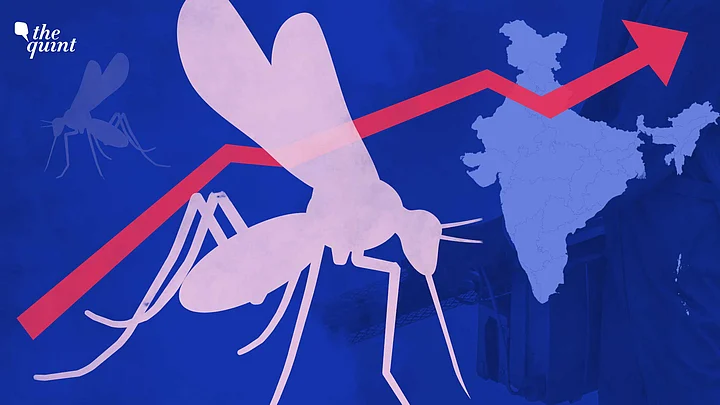As an atypical surge in dengue incidence engulfs India, as many as 1,16,991 cases of the vector-borne disease have been reported across the country this year, indicates the latest government data.
Nine states and Union territories – Haryana, Kerala, Punjab, Rajasthan, Tamil Nadu, Uttar Pradesh, Uttarakhand, Delhi, and Jammu and Kashmir – continue to observe a high caseload of dengue in November, even after the withdrawal of the precarious monsoon season that is associated with the disease.
In the national capital, which has witnessed a massive dengue outbreak, over 2,700 cases have been reported this year. Of these, 1,171 cases were reported in the first week of November.
While it is not possible to ascertain a singular factor that has led to the unprecedented dengue outbreak in Delhi and elsewhere, health experts posit that a variety of antecedents may have led to the surge.
How Dengue Spreads
Dengue is a mosquito-borne viral infection, found in tropical and sub-tropical climates worldwide, usually in urban and semi-urban areas.
Dengue virus is transmitted by female mosquitoes, primarily belonging to the species Aedes aegypti. The vector mosquitoes breed in stagnant water that collects around residential areas, especially during the monsoon season.
These mosquitoes typically lay eggs near standing water in containers like underground tanks, coolers, receptacles, buckets, animal dishes, flower pots, refrigerator trays, and vases.
Experts decode the various possible factors that account for the high transmission of dengue this year.
1. Delayed Retreat of Monsoon
Dr Om Shrivastav, infectious diseases specialist at Mumbai's Jaslok Hospital, suggests that the protracted monsoon may have been a major contributing factor to the high caseload of dengue this year.
"The withdrawal of the monsoon was quite delayed this year. The accumulation of water due to the heavy rains, which continued well into October this year, may have led to the surge," he explained.
India received 41 percent more rainfall than normal in the first three weeks of October, as per the Indian Meteorological Department. The country also recorded 125 extremely heavy rainfall events during September and October, the highest in five years, news agency PTI reported, citing IMD.
Delhi-based physician Dr Suranjeet Chatterjee, speaking about the dengue outbreak in the national capital, said "The numbers this time have shown a significant rise. Prolonged rains could be the reason behind this."
Delhi had recorded 94.6 mm of rain in the month of October – making it the wettest October since 1960, as per the IMD.
2. Epidemiological Patterns
Public health and policy expert Dr Chandrakant Lahariya observes that epidemiological trends also play an important role in determining the caseload of a vector-borne disease in a particular year.
"The vector-borne disease follows a certain pattern. You will see that every three-four years, there is a rise in dengue. Programme mangers, while planning preventative practices, should be wary of this," he tells The Quint.
India had last seen an unusual dengue spike in 2017, when the country had reported 1,88,401 cases of the mosquito-borne disease.
Dr Om Shrivastav, explaining why this happens, said that viral vectors are 'elastic' in nature, in that they tend to change their traits every few years, leading to a difference in the prevalence of the disease that they transmit.
This pattern has been observed in the national capital as well.
"Every four-five years, the numbers of dengue rise in Delhi. This is a cyclical pattern that we have observed," Dr Suranjeet Chatterjee, Senior Consultant – Internal Medicine, Apollo Hospital, tells The Quint.
Delhi had last seen a massive dengue outbreak in 2015, when the city had recorded 15,867. Before that, Delhi had seen over 6,200 cases in a dengue wave in 2010.
3. The Prevailing COVID-19 Pandemic
India saw a harsh second wave of COVID-19 in the early months of 2021, which, when it declined, left experts warning of the possibility of a third coronavirus wave.
While the governments were busy dealing with COVID preparations this time, perhaps the cautionary measures for dengue got less attention, suggests Apollo Hospital's Dr Chatterjee.
"Vector-borne diseases depend on two factors – public health interventions and epidemiology. Every few years, there is a rise in dengue cases. This year, it is possible that health functionaries were more occupied with COVID and the dengue surveillance suffered."Dr Chandrakant Lahariya
Cases of co-infection, where a patient has been diagnosed with both COVID and dengue, leading to a more sizeable bodily response, have also been observed this year.
What Are the Measures That Can Be Taken to Prevent Dengue?
A number of preventive practices, employed at the individual and the administrative level, can help ameliorate the transmission and impact of dengue.
"At the government level, this outbreak is a reminder that vector-borne diseases are still very much a reality, and that appropriate measures need to be taken to deal with them," states Dr Lahariya.
"The measures should be taken well before the onset of the disease. Public awareness about the disease should be spread, sanitation should be maintained, and adequate healthcare resources should be allocated to deal with dengue. Once more cases are reported, house-to-house checks and fogging can be done."Dr Chandrakant Lahariya
At the individual level, people should ensure that no pooling of water takes place at their neighbourhoods and workplaces. Disposal of waste needs to be done in a proactive and hygienic manner, in order to prevent the breeding of mosquitoes.
If one develops symptoms of dengue, such as high fever, headache, fatigue, and nausea, they should immediately consult a trained physician and access timely care.
